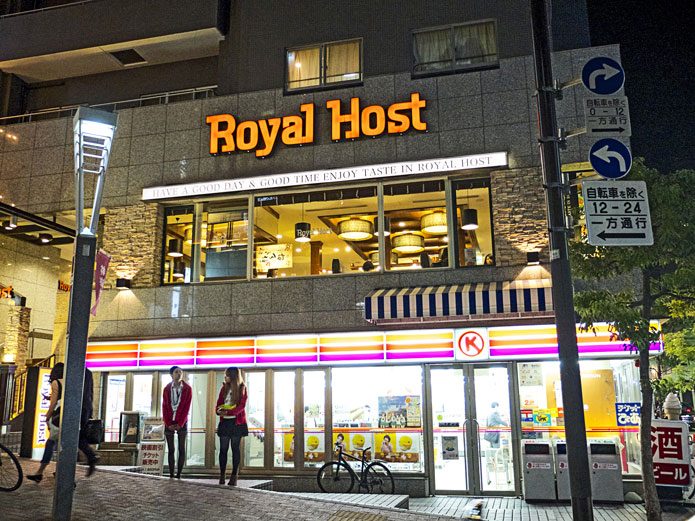
Hito ga tarinai! (We can’t get enough people!) is being heard increasingly in Japan’s retail and service sectors. With crackdowns on unpaid overtime threatening to exacerbate the pinch, management is being forced to get creative to make sure sufficient staff are on hand.
On 25 November, Toyo Keizai Online reported that to conserve human resources (and avoid being stigmatized as a “black company” that overworks its staff), several restaurant chains have announced plans to cut back on hours of operation.
Royal Host, for example, announced late in 2016 it would suspend all-night operations until January, and was also mulling selective holidays for outlets one day a week. Over the past several years, about one-fifth of Skylark restaurants have been closing two hours earlier than previously. McDonald’s Japan has reduced the number of outlets operating round-the-clock by around 40% over the past two years. And in March 2016, Aeon supermarkets in the greater Kanto area began closing one hour earlier.
On 23 December the Nikkei Marketing Journal (NMJ) reported on some innovative attempts to tap latent worker availability. For housewives, that might mean only for a few hours a day when they can get away from caring for an elderly parent or toddler.
When the Izumi Yume Town Hiroshima shopping centre put out word that it would accept part-timers for as little as two hours a day, it received a greater than anticipated number of applicants.
One way in which employment agencies have started tapping the pool of underutilised workers is by harnessing the LINE smartphone application. In theory, one worker might post a message on a network saying, “Sorry, I can’t make it in today—my child just developed a high fever”. To this another might respond, “I can fill in for you”.
In February last year, McDonald’s Japan, another company that relies heavily on part-time workers, went online with a new system called Omakase! Makku. This allows people looking for a part-time job at outlets close to their homes to quickly arrange interviews and start work, even on the day they apply. Applications can be made either by telephone or via the web. This flexible, worker-driven system, referred to in the NMJ as wagamama kinmu (literally, selfish employment), may very well be a wave of the future.
To enable part-timers to make contributions to the national pension fund, the law was recently changed so that people who work as little as 20 hours a week can pay into the system. However, this may backfire in the short term—a survey of 52 major enterprises found that nearly twice as many firms (19) said workers had requested a cut in their working time compared with those who wished to work longer hours (10).